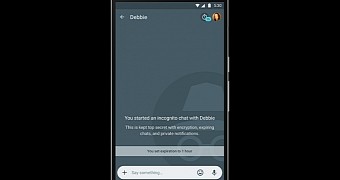Google has just released the second mobile app that it was working on, first announced during Google I/O, but it seems that the company has made some significant changes to the app. Google's Allo privacy features are lacking.
Google first announced Allo and Duo in May and decided to release its video calling app first, while leaving Allo for this month. Google Allo is undeniably a new and exciting chat app, a perfect alternative to other apps, like Facebook's Messenger and WhatsApp. But there's a catch.
At the time of its announcement earlier this year, Google stressed that Allo would be focusing on new privacy features that would store messages only transiently and not indefinitely. End-to-end encryption in Incognito Mode was also announced and kept in the final version, but the issue might be with permanently stored messages on Google servers.
The final version of Allo rolled out recently and, as it turns out, messages are stored indefinitely, until the user decides to delete them. Incognito Mode does come with end-to-end encryption and users are able to set a timer for automatically deleting messages, just like in WhatsApp. But Google had announced another privacy feature back in May, one that wouldn't require chats to be stored on its servers.
Google Assistant requires access to messages in Allo
The change seems to have come in relation to Google's AI technology, Google Assistant. The thing that makes Allo stand out from other messaging applications is the fact that the app learns the user's behavior and predicts replies, even to pictures.
In order to do so, Allo needs access to as much data as it can get, and while testing the application, Google decided that the best way to go was to store messages on its servers. However, this move would mean that privacy was traded in for ease of use, which might not be to the liking of some users.
In fact, even Eduard Snowden stated on his Twitter account that Google Allo is a “Google app that records every message you ever send and makes it available to police upon request.”
He added that last year, US courts approved 100% of requests for surveillance, which poses a risk to the privacy of Allo users. By contrast, WhatsApp has end-to-end encryption of messages by default, but it recently announced looser privacy features, as it now shares the user's phone number with Facebook.
What is #Allo? A Google app that records every message you ever send and makes it available to police upon request. https://t.co/EdPRC0G7Py — Edward Snowden (@Snowden) September 21, 2016

 14 DAY TRIAL //
14 DAY TRIAL //